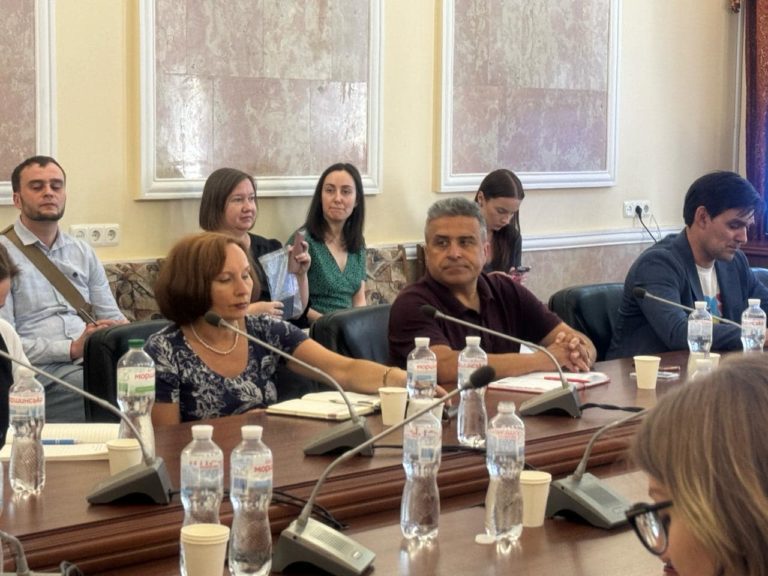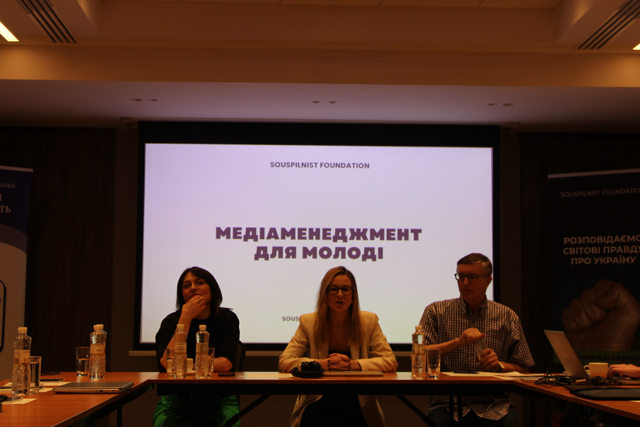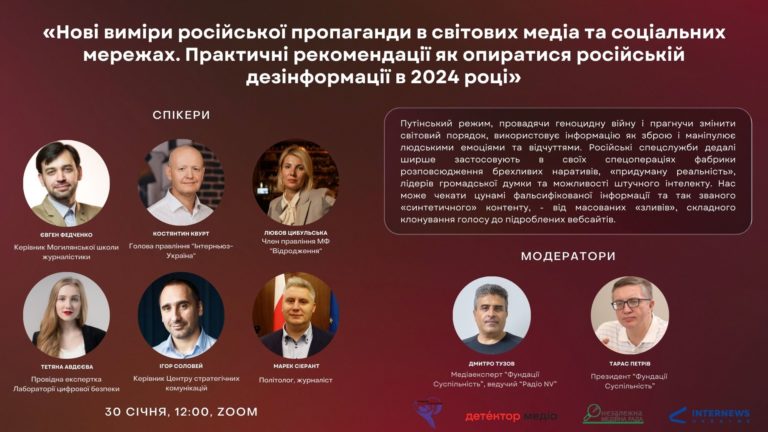On January 29, intensive online training took place at the Media Management School, organized by Souspilnist Foundation, with the support of Internews Ukraine and Detector Media.
Over 70 journalists from across Ukraine took part in the training session. Among the School’s lecturers were Anatoliy Bondarenko, co-founder of Texty.org.ua, Tetiana Kyselchuk, general producer for UA:PBC digital platforms, Dmytro Tuzov, NV Radio host, Oleksandr Omelchuk, IT-creator, co-founder of the OMTV (UA) channel group, Nataliia Kurdiukova, co-founder of “Nakypilo”, Kharkiv, Sofiia Deychakivska, co-founder of the “Kufer” project, Ivano-Frankivsk, Andriy Sydorenko, head of the CareYou program, Adrian Karmazyn, chief of the Ukrainian Service of the Voice of America (1987-2015).
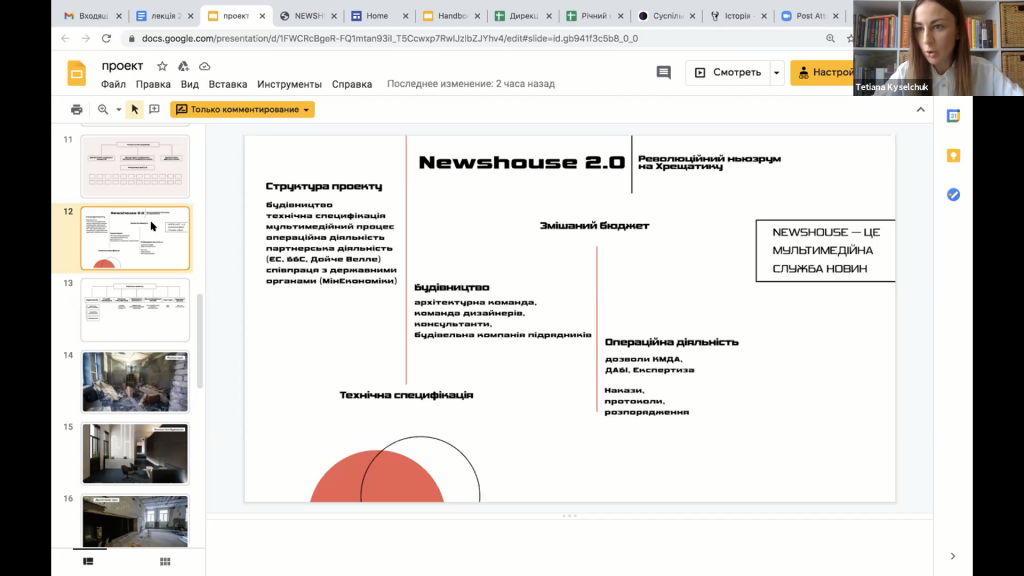
The speakers taught the main tools that are essential for media managers – from drawing a timeline to organizing the team’s work and monetizing projects, as well as shared their own experience and provided case studies.
“A media manager is a person of soft skills that cannot be measured, such as speed, creativity, being organized, discipline, etc. That is, the skills a manager should have,” said Tetiana Kyselchuk.
Tetiana Kyselchuk shared her own media manager experiences and provided advice to beginners. Specifically:
- Include taxes in your planning. “Taxes are a sacred thing, take time to understand the difference between PE and civil contracts, it’s not so difficult. I’ve seen people who calculated their budgets without taxes and then when it came down to civil agreements (which is 41% in taxes), the budget grew two-fold”.
- If a project includes filming, count the shifts. “For instance, when I had to film a dozen lectures and the lecturer asked me to do it in two days because it was a lot of work, it was easier for me to pay the lecturer extra money than pay three operators for two shifts.”
- Save costs whenever possible. “Each project is a math problem. You’ve got “given” but the solution to the problem will actually depend on your inventiveness.”
- Get a clear project structure and annual plan. “Besides, you should be organized and self-disciplined because you are responsible for your people’s mistakes. Learn to say “no”. If you’re not ready to take on responsibility, do not become the project manager.”
- You should see value in your project. “Ideas should have value even if it is a commercial project. It may sound pompous, but I believe in it.”
According to Anatoliy Bondarenko, in the Ukrainian realities, creating quality journalism is a value for journalists. Not Russia-style journalism but Western-style. We should not get trapped by Russian either. Naturally, such a position results in less potential readers but, on the bright side, another platform emerges that is oriented toward Ukrainians.
“It’s also important to understand that a quality but “slow” media is most likely to not bring profit, and we’re talking not only about Ukraine now. In America, too, quality journalism cannot sustain itself,” added the expert.
Under such conditions state support is important, just as is support from independent donors, entrepreneurs, readers.
“We are living in a world of paid-for political stuff; the last election showed that 90% of the media are engaged in paid-for journalism both in the regions and in the center,” – added Dmytro Tuzov.
Therefore, with regard to monetization, the issues of transparent ownership, “clean” broadcasts, adhering to standards and understanding your target audience are also important.
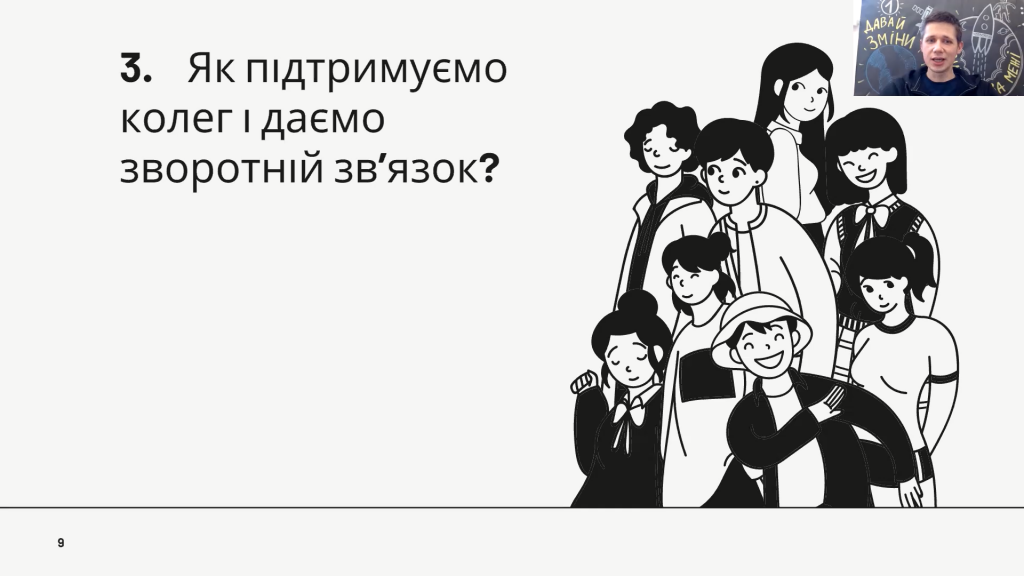
In the Frankivsk “Kufer”, they opted for the model of collaborating with local NGOs and projects, not businesses.
“Launching a project is the easiest part. As you launch it, it seems to you that you can exhale with relief. No, in reality, everything is just starting, you’re just starting out,” Sofiia Deychakivska spoke from experience.
Coming back to values, the experts noted that the main value of any project is the team and the values that keep people together, while the technicalities could always be taught.
“Even in Kharkiv, it’s quite problematic to find someone who could stand by you, also ideologically, but especially when these people are enthusiastic about what’s going on around them. And that’s the first component of your own project even if you start a media as a business,” said Nataliia Kurdiukova.
Andriy Sydorenko specifically taught how, when and what should be communicated to the team, how to support colleagues to avoid burnout, and provide quality feedback.
“Mutual support and healthy connections shape the team’s mental health. Overall, we don’t have a culture of paying attention. However, taking care of things that people find important contributes to those people’s very desire to work and realize their potential,” noted Andriy Sydorenko.
Follow the news on Souspilnist Foundation’s website and Facebook page to learn about the new events for media professionals.
